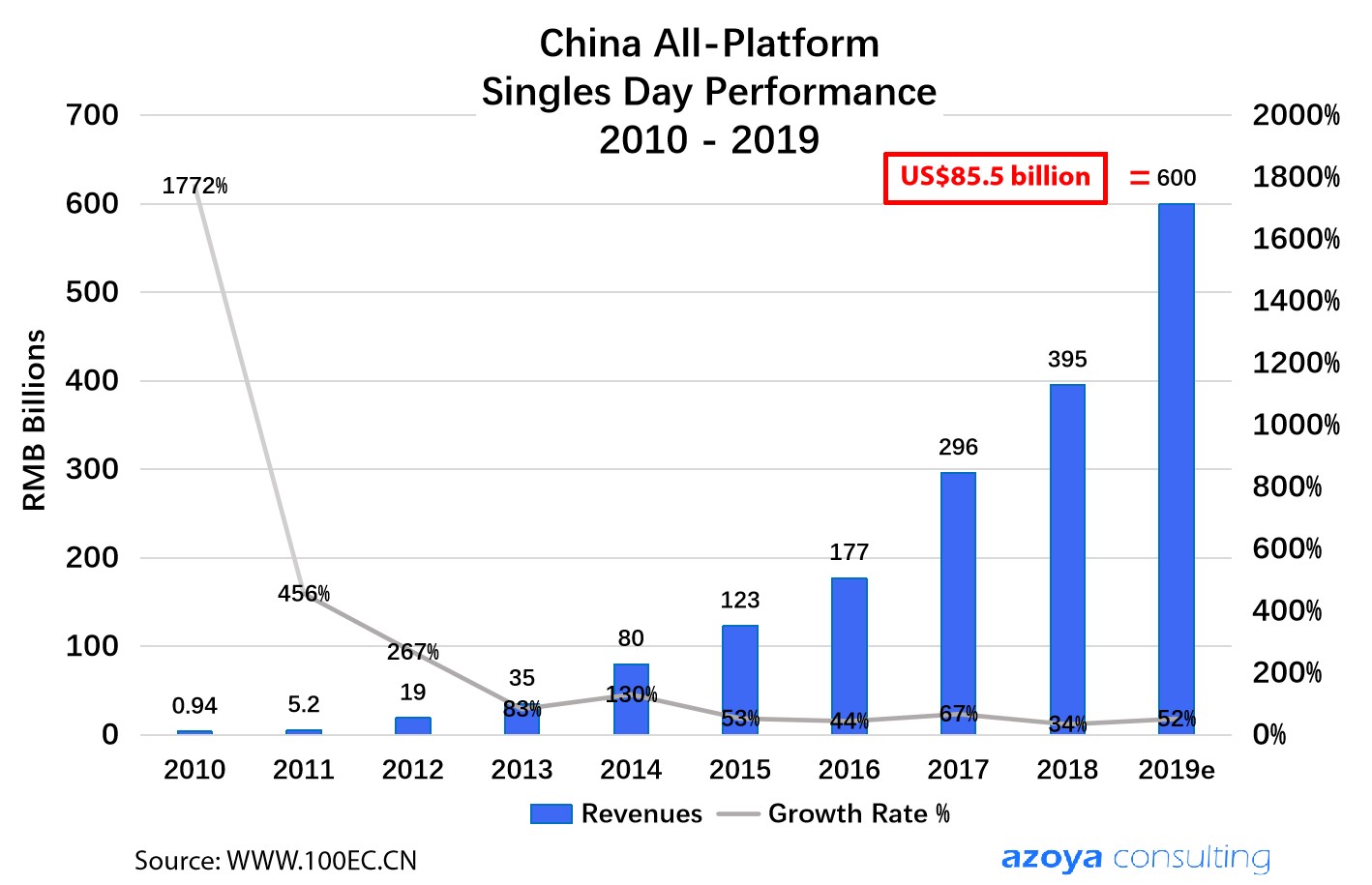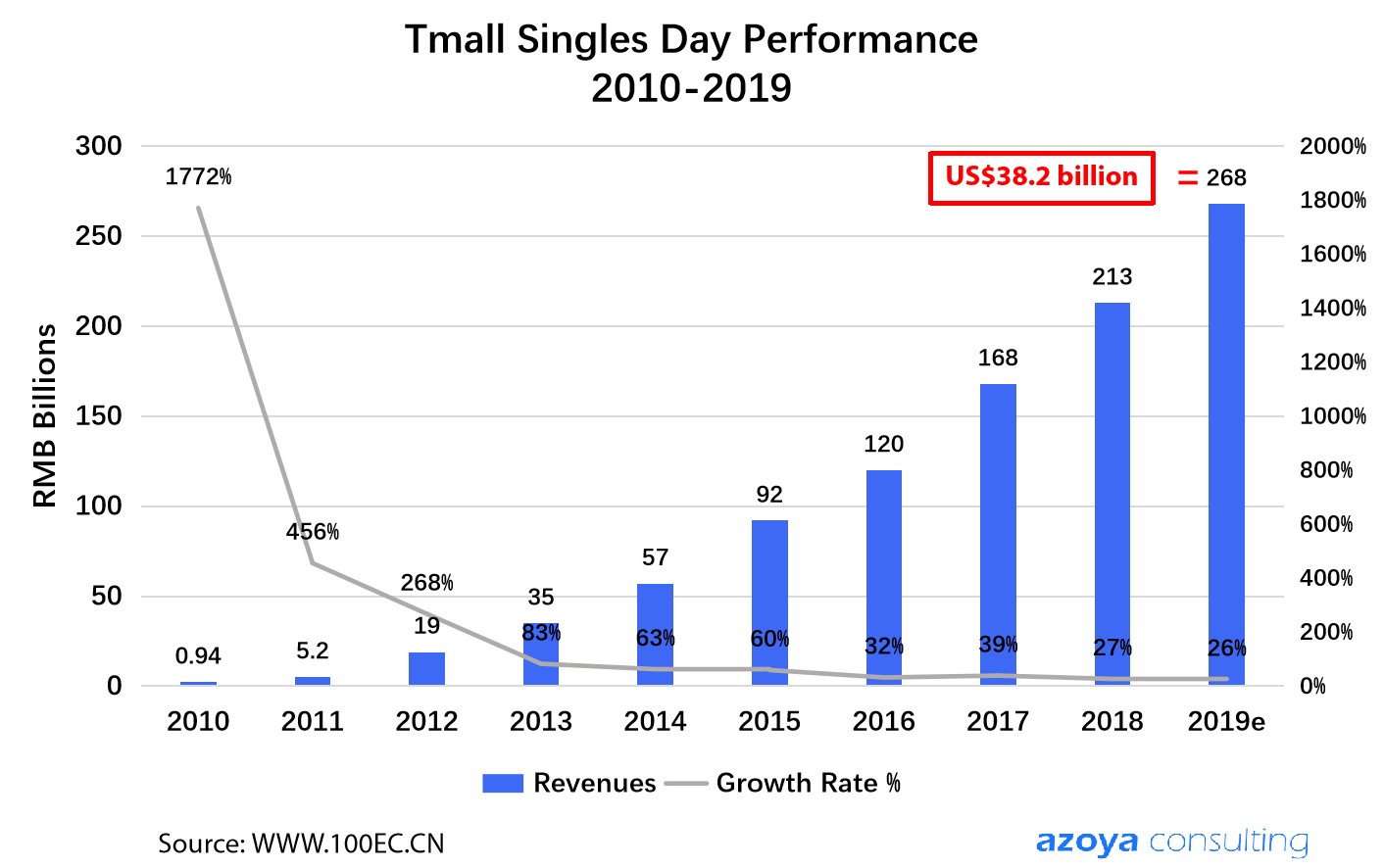A Wrap-Up of Singles Day 2019
Singles Day 2019 saw an increased focus on lower-tier cities and livestreaming. We take a deeper look and check out which categories and brands did well this year.
by Azoya Consulting
Today's e-commerce market is oversaturated and many players are losing steam and losing money.
And yet Alibaba recorded a whopping 268.4 billion RMB (US$38.4 billion) in GMV this year, a 26% jump from last year's Singles Day.
While growth is slowing, it is still strong and quite impressive for a company as large as Alibaba.
We do a brief wrap-up and dive deeper into how cross-border e-commerce performed this year.


Alibaba growth powered by lower-tier cities, livestreaming, and new brands
Alibaba is a company with incredible foresight and long-term vision. Early on, management knew that the market was going to get more competitive and so they laid the groundwork for new strategies long before they were needed.
This included focusing on lower-tier cities, integrating online-offline retail, and building an ecosystem of livestreaming influencers on Taobao.
Lower-tier cities: 102 million new users participated in Singles Day this year, most of which were from lower-tier cities. Alibaba claims that over 70% of new users in fiscal year 2019 came from lower-tier cities
New product launches: over 1 million new products were launched for Singles Day. Launching limited-edition products such as MAC lipstick help Alibaba to stand out because its competitors do not have the same product selection.
Livestreaming: Taobao livestreaming raked in 10 billion RMB worth of sales within the first 8 hours and 55 minutes of Singles Day. Over 100,000 brands did livestreaming to promote their products. Top brands included MAC, Levi's, Ralph Lauren, Sisley, and Burberry.
While Taobao livestreaming has been around for years, only this year has it become a major focus, as the market has become more competitive and as brands look for more ways to capture customers' attention.
Livestreaming is a good way to activate potential customers that have been browsing your products for a long time but have been reluctant to make a purchase. It is particularly useful for marketing more visual products such as apparel and cosmetics.
Looking to Enter the China E-Commerce Market? Check out our China e-commerce services |
Who were the top sellers?
299 brands each brought in 100 million RMB (US$15.1 million) in revenues on Singles Day, up from 237 in 2018.
Top brands included Estee Lauder, Apple, Li Ning (sportswear), Bosideng (apparel), Perfect Diary (cosmetics), and HomeFacialPro (skincare).
Here are some brands that raked in over 1 billion RMB (US$15.1 billion) in GMV across multiple platforms (not just Tmall): Uniqlo, Semir (apparel), Gree (air conditioners), Anta (sportswear), Linshimuye (furniture), Estee Lauder, Xiaomi (smartphones), Haier (white goods appliances), and Midea (white goods appliances).
What does this mean?
1. More sales are concentrated in the hands of a few big brands. The amount of capital required to compete effectively during such holidays has gone up.
2. Chinese brands are becoming more and more popular, as this list was previously dominated by foreign brands.
How did cross-border e-commerce fare on Singles Day 2019?
In total, 22,000 cross-border e-commerce brands from 78 countries participated in Tmall Global's Singles Day promotions, selling over 620,000 imported products, most of which cannot be found in China due to various reasons.
Over 120,000 new products were launched just for Singles Day, an indication that the big day is a great way to build brand awareness.
To further entice customers, 2,500 of these brands covered the costs of import duties and shipping; Alibaba also provided interest-free installment loans for 24 months.
Which categories were hot? Tmall notes that beauty tech gadgets, imported cultural products, sleeping pills/aids, pet food, products for the elderly, and male skincare products were popular.
Japanese beauty tech brand Ya-Man sold 6,000 products within just 30 seconds. Note that each of these products cost over 10,000 RMB (US$1510).
Which trends did Azoya see this year? Top categories included beauty, skincare, and health products.
More specifically, we saw increased demand for facial masks, tooth whitening products, perfume, eye shadow, skin moisturizer, anti-wrinkle cream, laxatives, and ginkgo leaf extract. Many of these products include ingredients that cannot be found or manufactured in China, or cannot be imported due to animal testing laws that cosmetics brands have to abide by.
Key Takeaways
1. Despite its size, Alibaba was able to maintain strong growth this year's Singles Day by focusing on lower-tier cities, helping brands launch new products, and using livestreaming influencers to activate sales.
2. More brands surpassed the 100 million RMB GMV mark, indicating that more sales are concentrated within the larger brands. However Chinese brands are gaining in popularity
3. Cross-border e-commerce continued to do well this year. Popular subcategories included beauty tech gadgets, pet food, sleeping aids, tooth whitening products, and other products with ingredients that are difficult to find in China.